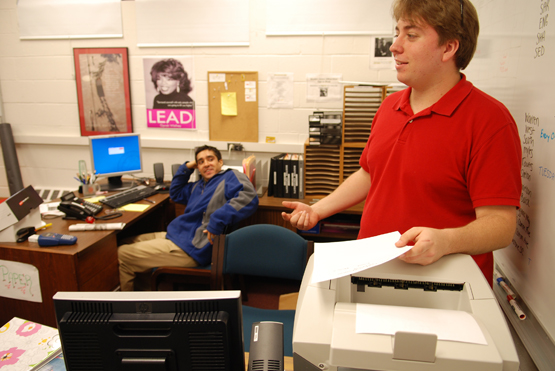University Responds to Students’ Printing Proposal
Price will drop four cents a page

Leaders of the Student Union responded positively yesterday to news that the University would lower the cost of printing from 12 cents to 8 cents a page, but would leave in place its 100-page quota on free printing. Word of the change, which takes effect in January, came from Dean of Students Kenneth Elmore in a morning meeting with John Bavlsik (CAS’11), chair of the Student Union’s technology committee, and Anant Shukla (CAS’10), a Student Union senator and member of the group’s print quota task force.
Bavlsik describes the move, which came more than a month after the Student Union presented to University officials a three-point proposal listing suggested changes, as “definitely positive,” despite its leaving quotas as is. He says he has seen statistics on students’ usage and believes that routine consumption of paper has been wasteful.
“The University’s logic is that the 100 pages is not a quota so much as a subsidy,” says Bavlsik. “BU is not intending to cover our academic need by paying for all printing.”
Shukla says he’s pleased that the administration considered the views of students about the existing policy. “Every single party that is affected by this had a voice at the table,” he says. “That’s the most beneficial thing that came out of this entire issue.”
Elmore says the students’ proposal, which recommended raising the undergraduate quota to 250 pages, keeping the cost per page above quota at 12 cents, and appointing students to a committee to provide input on future changes, “raised some valid and legitimate concerns.” He says the University’s lowering of page cost was an effort to “meet student demands halfway.”
“I hope that in the long run it really gets people thinking about their printing,” he says.
The existing printing policy, launched at the beginning of this semester, is part of the University’s push to go green and to cut costs. It provides a 100-sheet quota per semester for undergraduate students, a 500-sheet quota for graduate students, and a 1,000-sheet quota for law students. The policy is the product of a working group convened last spring by President Robert A. Brown, which found that in fiscal year 2008 alone, nearly 13 million sheets of paper were used at computer labs managed by BU’s Information Technology.
Michael Krugman, associate vice president for information systems and technology, who chaired the working group, estimates that University printing costs ranged from $1 million to $7 million dollars per year.
The changes that went into effect in September included centralization of services. All computers connected to the University network now send documents to high-speed printers in Mugar Memorial Library, the School of Law (law students only), or mailrooms at select dormitories. The University has closed the resident computer labs and the basement lab at 111 Cummington St.
Students and faculty were concerned and upset when this semester’s changes were announced.
Bavlsik and Shukla penned a proposal in response and sent it to Elmore in mid-October.
University officials from the Provost’s Office and from Information Systems and Technology, as well as Elmore, discussed the student recommendations before meeting with Shukla and Bavlsik Wednesday morning.
The Student Union plans to launch a marketing campaign to spread the word about the reduction, Shukla says. He also hopes the new policy will be programmed to pop up on the home screens of library computers.
Meanwhile, University Provost David Campbell sent out an e-mail yesterday to faculty informing them of the shift.
“I encourage you, in preparing your course materials (including syllabi), to make maximal use of electronic distribution and/or course packets that can be separately purchased and further to reduce printing needs by promoting electronic submission of papers,” the message reads.
BU’s newest printing policy measures up generously when compared with those of other local universities. Tufts University charges 10 cents per sheet, with no free quota. Northeastern University allows students 400 sheets per semester, but charges 10 cents a page after that. And Boston College requires students to charge $15 on their ID cards to cover a three cent per page charge, up to 500 sheets. Students must add more money if they exceed that quota.
Shukla says his research shows that nationwide, most universities do not have quotas, and most charge more than BU’s eight cent fee.
Leslie Friday can be reached at lfriday@bu.edu.
Comments & Discussion
Boston University moderates comments to facilitate an informed, substantive, civil conversation. Abusive, profane, self-promotional, misleading, incoherent or off-topic comments will be rejected. Moderators are staffed during regular business hours (EST) and can only accept comments written in English. Statistics or facts must include a citation or a link to the citation.